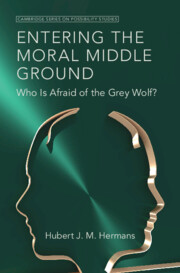Book contents
- Entering the Moral Middle Ground
- Cambridge Series on Possibility Studies
- Entering the Moral Middle Ground
- Copyright page
- Dedication
- Contents
- Figures
- Tables
- Preface
- Acknowledgments
- Introduction
- Chapter 1 Dialogical Self Theory and the Process of Positioning
- Chapter 2 Embracing Bad as Good via Internalization
- Chapter 3 Rejecting Bad via Externalization
- Chapter 4 The Vitality of the Moral Middle Ground
- Chapter 5 Contradiction as Intrinsic to the Multiplicity of the Self
- Chapter 6 Multilevel Identity and the Moral Middle Ground
- Glossary
- References
- Index
Chapter 5 - Contradiction as Intrinsic to the Multiplicity of the Self
Published online by Cambridge University Press: 15 March 2024
- Entering the Moral Middle Ground
- Cambridge Series on Possibility Studies
- Entering the Moral Middle Ground
- Copyright page
- Dedication
- Contents
- Figures
- Tables
- Preface
- Acknowledgments
- Introduction
- Chapter 1 Dialogical Self Theory and the Process of Positioning
- Chapter 2 Embracing Bad as Good via Internalization
- Chapter 3 Rejecting Bad via Externalization
- Chapter 4 The Vitality of the Moral Middle Ground
- Chapter 5 Contradiction as Intrinsic to the Multiplicity of the Self
- Chapter 6 Multilevel Identity and the Moral Middle Ground
- Glossary
- References
- Index
Summary
Contradictions in intellectual history are presented in this chapter regarding: scientific discoveries in physics and biology, Montaigne’s prolific self-investigation, and research on self-complexity. There are also cultural differences: East Asians view the world as being involved in constant flux and are tolerant of contradictions. This tolerance is more problematic for Western individuals, who tend to experience contradiction as a threat to their self-esteem. The Japanese folkloristic figure of yokai is presented as an example representing a coalition of good and bad. Furthermore, utopian ideals are critically discussed as embracing one ultimate end position, with the denial of the fundamentally contradictive nature of human beings. The work of Carl Jung on "shadows" is introduced and compared to the moral middle ground. The process of generative dialogue is proposed as a way to deal with contradictions. Finally, some practical implications are presented: the fostering of self-empathy, stimulating tolerance of uncertainty, and the influence of high-quality listening on the softening of the boundaries of the self.
Keywords
- Type
- Chapter
- Information
- Entering the Moral Middle GroundWho Is Afraid of the Grey Wolf?, pp. 185 - 222Publisher: Cambridge University PressPrint publication year: 2024

